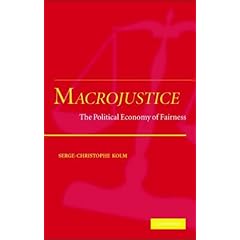您的位置:
人大经济论坛
> 政治经济学> [下载]Cambridge《宏观公平:公平的政治经济学》(Macrojustice: The Political Economy of Fairness )[下载]Cambridge《宏观公平:公平的政治经济学》(Macrojustice: The Political Economy of Fairness )
发布时间:
来源:人大经济论坛
Macrojustice: The Political Economy of Fairness
by Serge-Christophe Kolm (Author)

"Professor Kolm continues his deep investigations into the nature of justice and, in particular, just income transfers. He justifies his proposal on the basis that justice is determined by the values of the society. In the course of his examination, he probes into the logic of many aspects of justice and the various theories currently under discussion." Kenneth Arrow, Stanford University
"Macrojustice, which concerns the overall distribution of economic wealth, is a prominent and time-honored object of philosophical and social science scholarship, the current relevance of which is highlighted by the widening economic disparities of recent decades. Serge-Christophe Kolm, who not only possesses an impressive breadth of knowledge of this literature but also is a prolific contributor to it, proposes and thoroughly defends an ambitious theory in this tome that, to its credit, integrates the concepts of basic needs, efficiency, proportionality and desert based on a structure of freedom, impartiality and information, and that sets a very high standard for work in this area." James D. Konow, Loyola Marymount University
"Serge Kolm is one of the most prolific and deeply original thinkers of our time. His footsteps are engraved in many research areas including normative economics, public economics, and political philosophy....even these skeptical readers would no doubt find the experience of being exposed to Kolmas ideas/reasonings fascinating and rewarding in rethinking and reorienting his/her own conceptions of fairness. It gives me pleasure to recommend this book to those who would like to think systematically about fairness." Kotaro Suzumura, Institute of Economic Research, Hitotsubashi University
Book Description
The main features of the just society, as they would be chosen by the unanimous, impartial, and fully informed judgment of its members, present a remarkable and simple meaningful structure. In this society, individuals' freedom is full respected, and redistribution amounts to an equal sharing of individuals' different earnings obtained by the same limited "equalization labour." This also amounts to general balanced reciprocity, where each individual yields to each other the proceeds of the same labour. The concept of equalization labour is a measure of the degree of community, solidarity, reciprocity, redistribution, and equalization of the under consideration. It is determined by a number of methods presented in this study, which also emphasizes the rationality, meanings, properties, and ways of practical implementation of this optimum distribution. This result is compared with various distributive principles found in practice and in political, philosophical, and economic thinking, with the conclusion that most can have their proper specific scope of application. The analytical presentation of the social ethics of economics is particularly enlightening. Serge-Christophe Kolm is the author of more than thirty books and several hundred professional articles concerning, notably, normative economics, public economics, macroeconomics, social change, and political psychological philosophy. He is Professor and Director at the Ecole des Hautes Etudes en Sciences Sociales, Paris.
Presentation page 1
part one. bases: consensus, freedoms, and capacities
one. introduction
1 Macrojustice: An overview of its place, method, structure, and
result 9
two. freedom
2 Social freedom 40
3 The liberal theory 53
4 Free and equal in rights 70
three. resources
5 Resources 82
6 Capacities 90
part two. overall distributive justice: elie (equal labour
income equalization)
7 Equal labour income equalization: General presentation 111
8 Models of labour and productivity 135
9 Equal duration income equalization 144
10 Information 167
11 Income justice 185
12 General equal labour income equalization: The model 207
13 Involuntary unemployment 212
part three. comparisons with policies and philosophies
14 Comparisons: General issues 221
15 Comparison with distributive schemes 233
16 Comparison with philosophies 244
part four. the degree of community, equality,
reciprocity, and solidarity
17 The degree of redistribution, solidarity, community, and reciprocity 279
18 Impartiality, consensus, and information 298
19 Disinterested judgments and the moral surplus 304
20 Communication and dialog 324
21 Impartialization to consensus 336
part five. comparison with economics’ social ethics
22 Related economic values 363
23 The structure and substance of distributive principles 389
24 Freedom and happiness 417
25 Freedoms, responsibility, desert, merit, equality of opportunity,
capacities, capabilities, basic needs 438
26 The theory of equivalence 463
27 conclusion 500
References and bibliography 504
Index 525
经管之家“学道会”小程序
- 扫码加入“考研学习笔记群”

推荐阅读
经管之家精彩文章推荐


